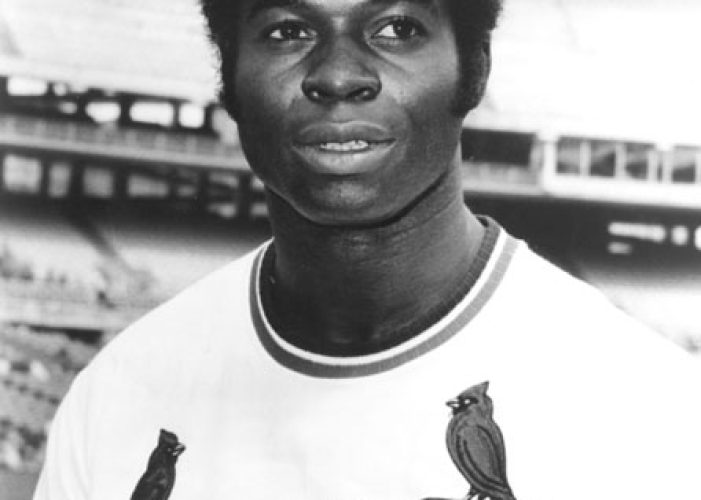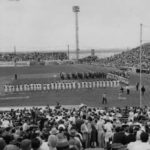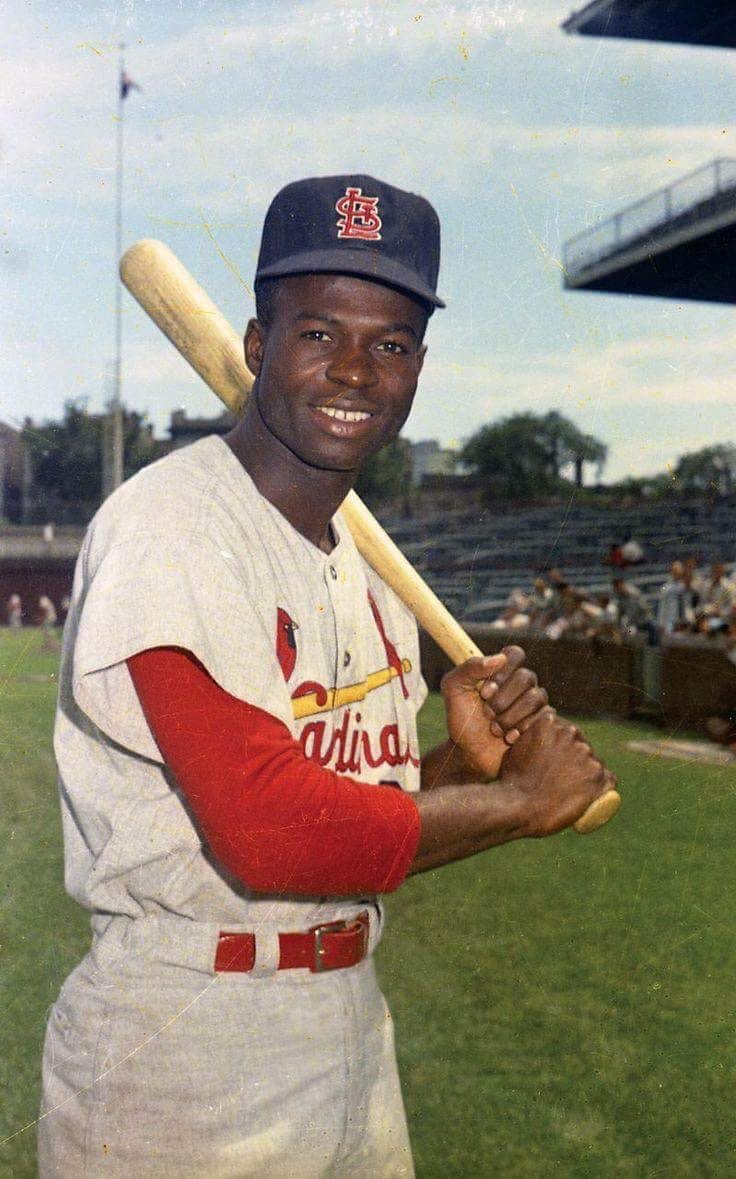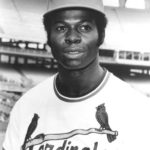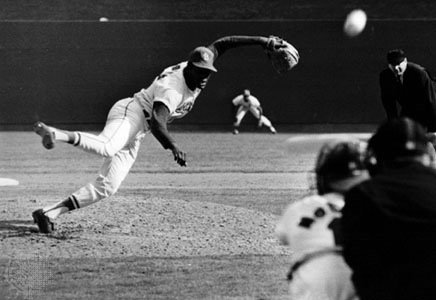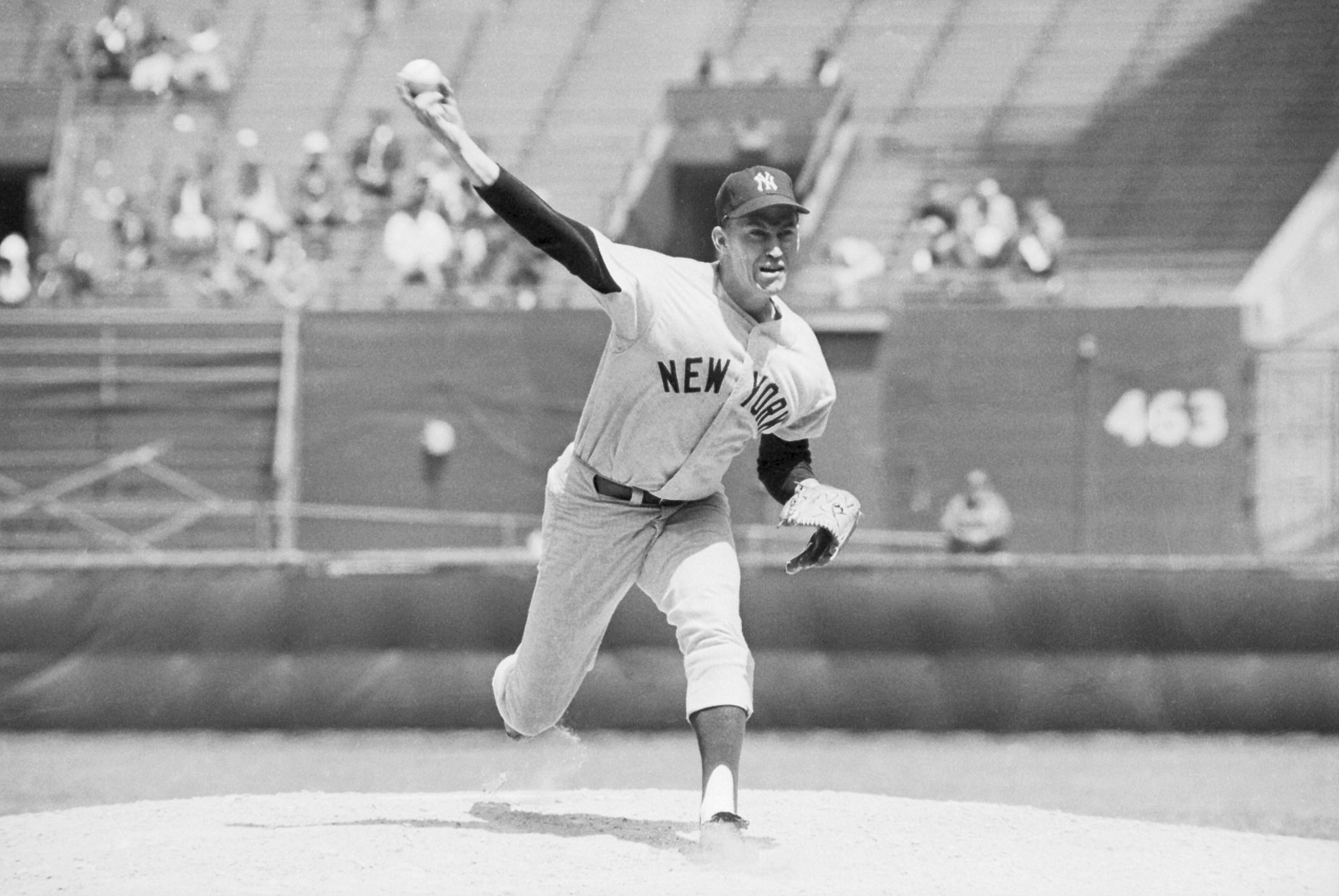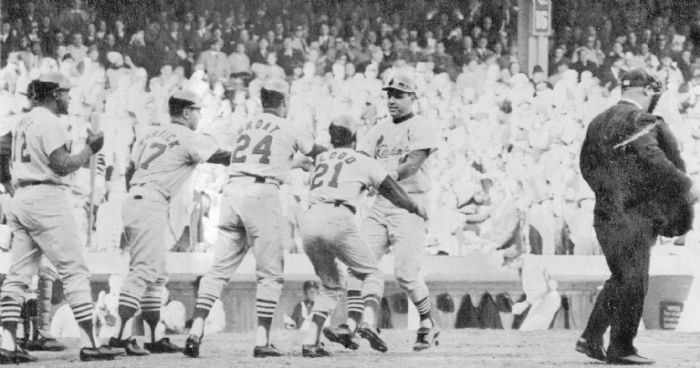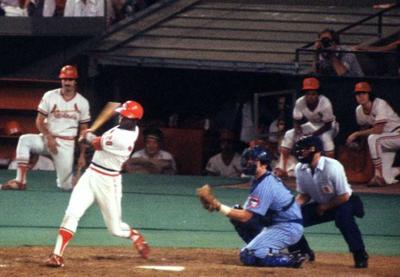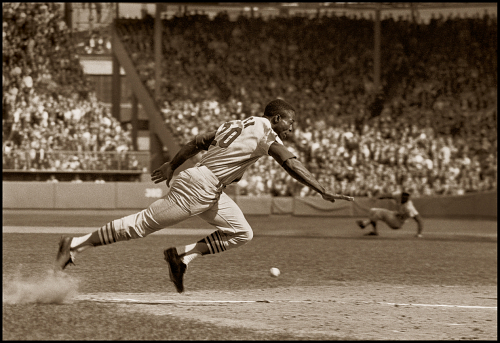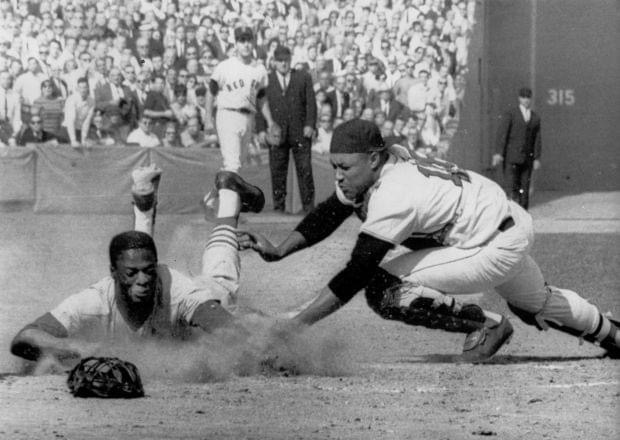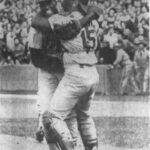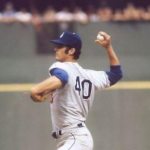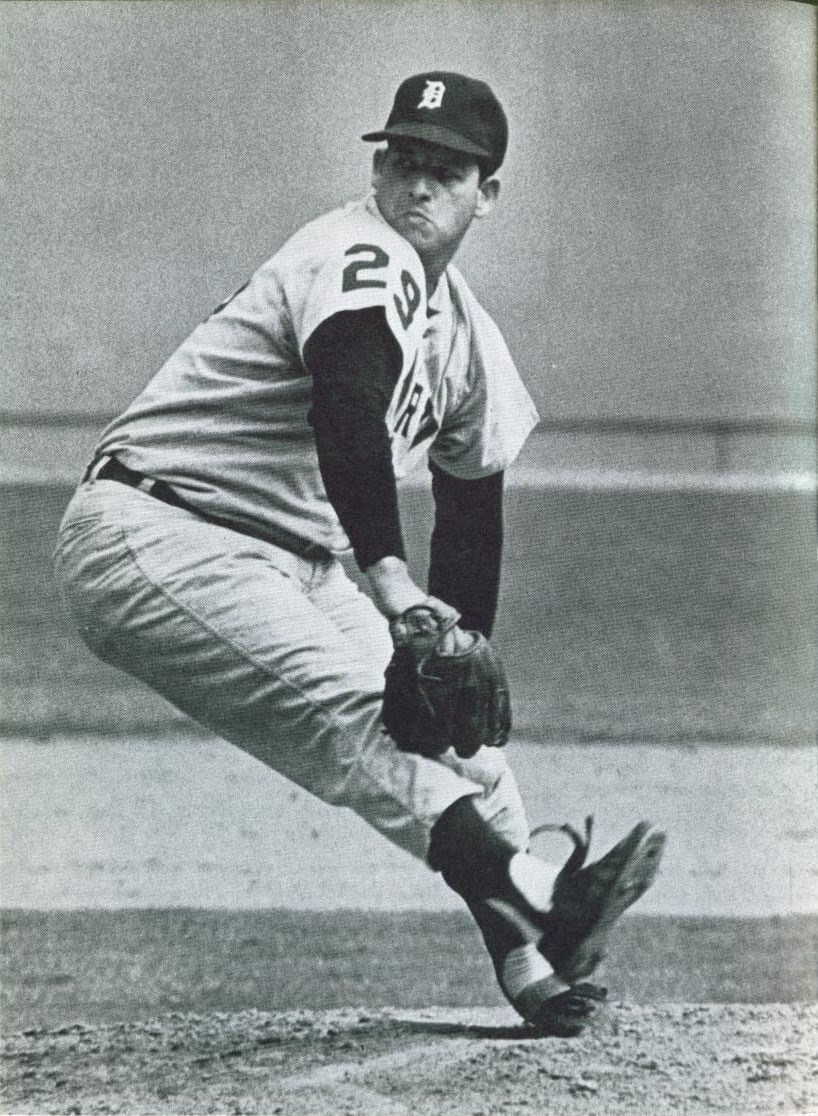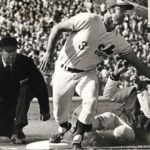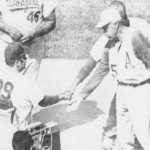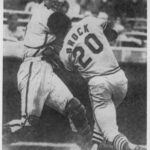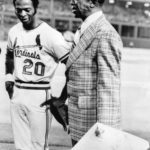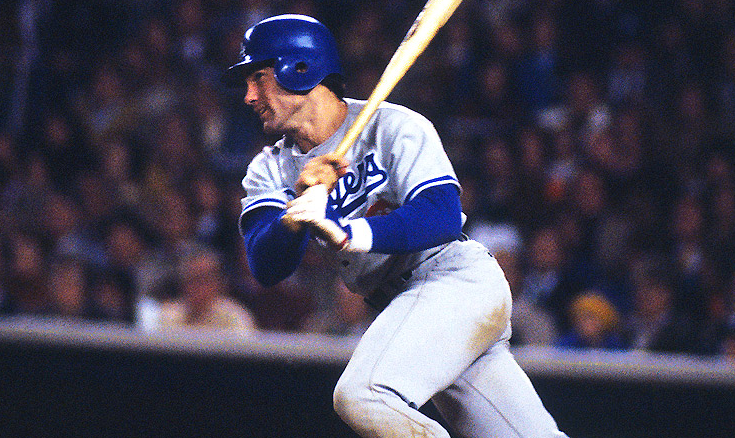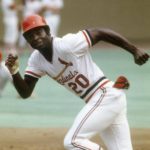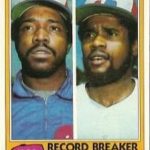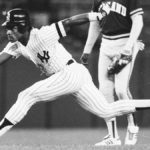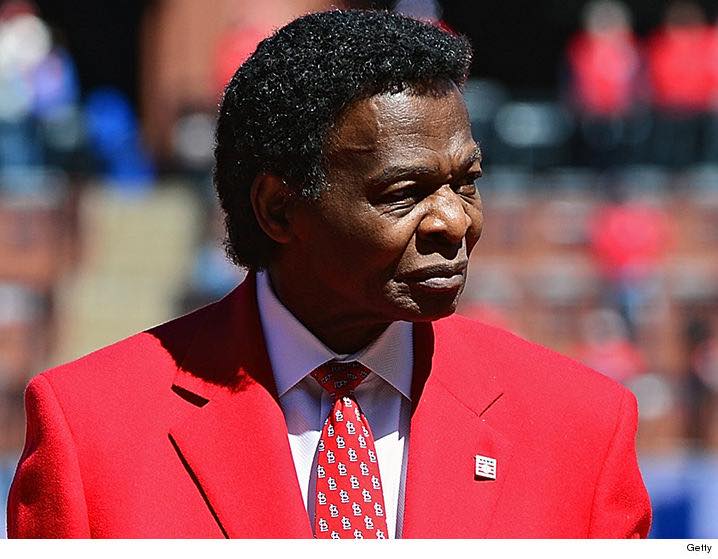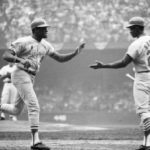Lou Brock
Position: Leftfielder
Bats: Left • Throws: Left
Height – 5-11 Weight – 170lb (180cm, 77kg)
Born: June 18, 1939 in El Dorado, AR
Death: September 6, 2020
High School: Union HS (Monroe, LA)
School: Southern University and A&M College (Baton Rouge, LA)
Debut: September 10, 1961 (9,504th in MLB history)
vs. PHI 5 AB, 1 H, 0 HR, 0 RBI, 0 SB
Last Game: September 30, 1979
vs. NYM 4 AB, 0 H, 0 HR, 0 RBI, 0 SB
Hall of Fame: Inducted as Player in 1985. (Voted by BBWAA on 315/395 ballots)
View Lou Brock’s Page at the Baseball Hall of Fame (plaque, photos, videos).
Baseball Reference Stats Page
Full Name: Louis Clark Brock
Nicknames: The Franchise or The Rocket
View Player Bio from the SABR BioProject
Nine Players Who Debuted in 1961
Carl Yastrzemski
Lou Brock
Boog Powell
Jim Fregosi
Sam McDowell
Dean Chance
Al Downing
Bill Freehan
Eddie Brinkman
The Lou Brock Teammate Team
C: Ted Simmons
1B: Orlando Cepeda
2B: Ken Hubbs
3B: Ron Santo
SS: Garry Templeton
LF: Billy Williams
CF: Curt Flood
RF: Roger Maris
SP: Bob Gibson
SP: Steve Carlton
SP: Larry Jackson
SP: Nelson Briles
SP: Bob Forsch
RP: Lindy McDaniel
M: Red Schoendienst
Notable Events and Chronology for Lou Brock Career
Larry Bowa, two time Golden Glove winner for the Philadelphia Phillies, once said of Lou Brock: “Everybody in the park knows he’s going to run and he makes it anyway.” And run he did. “Larcenous Lou” Brock blew stolen base records away during his long tenure in the game of baseball. He revived a lost art and brought the importance of the running game front and center. Brock’s amazing feats on the bases ushered in a new era of base running greats that the game hadn’t seen since Ty Cobb in the early 1900’s, including players such as Rickey Henderson and Vince Coleman. Combined with his hitting ability, Brock’s base running skills made him one of the most formidable offensive players of the late 60’s and 70’s.
How it all began
Lou Brock was born on June 18, 1939 in El Dorado Arkansas to Maud and Paralee Brock, the seventh of nine children. After his parents separated at a young age, Brock’s family relocated to the small rural community of Collinston, Louisiana. Growing up African American in the south was not easy during that time, and Brock was one of many children bussed miles in order to receive an education. The family worked hard, but times on a farm were tough and the family struggled. It was during this time that Brock first developed an interest in baseball. A mischievous Brock had gotten in trouble at school, and his teacher assigned him a report about baseball greats such as Jackie Robinson and Joe DiMaggio as a form of punishment. The research piqued Brock’s interest and introduced him to the game of baseball at a professional level.
Brock attended Union High School, where he met Katie, the first of his three wives. Upon completion of high school, Brock received an academic scholarship to Southern University in Baton Rouge, where he enrolled as a math major. Brock’s college career was threatened when he averaged a C+ his first semester and he was in danger of losing his financial support. Brock had volunteered to retrieve balls for the university’s baseball team and spent many hours running the field tirelessly to catch the balls that were hit during practice. After an exceptionally long afternoon, Brock fainted from exhaustion and was attended to by the coaches. They were impressed by his determination and decided to give him a shot at batting practice. Five pitches were thrown to him, three of which Brock knocked out of the park. Needless to say, the coaches were impressed, and they subsequently offered Brock an athletic scholarship and a place on the team.
Brock was a welcome addition to the team. His .545 batting average proved to be a key to Southern University’s clinching of the baseball championship in the National Association of Intercollegiate Athletes. In 1959, his talent caught the eye of the U.S. Olympic Committee and he was appointed to the United States baseball team for the Pan-American games in Chicago.
The Big Leagues
On August 22 1960, Lou Brock joined the Chicago Cubs organization. After putting up solid numbers for their top minor league team, the club called him up and Brock made his major league debut on September 10 1961 in a game against the Philadelphia Phillies. However, the future Hall of Famer’s rookie season was less then dazzling. Brock struggled at the plate, batting only .263. His desire to succeed translated into impatience at the plate, and he ended up striking out a total of 218 times over the course of his first two seasons with the Cubs. Brock’s fielding wasn’t much better under the harsh conditions of Wrigley Field. Cubs fans and baseball writers lamented his dismal performance, and critique of the young outfielder was often quite harsh. As the mid season trade deadline of 1964 approached, the Cubs engaged in talks with the St. Louis Cardinals about the possibility of acquiring Ernie Broglio, a pitcher who had led the NL in wins four years earlier, and who had recorded 18 wins in 1963. The St. Louis Cardinals needed to fill an outfield position that had been noticeably lacking since the great Stan Musial had retired. Brock became one of three players traded to the Cardinals for Broglio and two other players, a transaction that thrilled Cubs fans everywhere. The trade was considered extremely lopsided in Chicago’s favor. However, it later came to be viewed as one of the worst in Cubs franchise history. Ernie Broglio ended up recording only seven wins for the Cubs, and he retired less than three years later. On the other hand, Brock literally took off running, and he never looked back.
The St. Louis Cardinals had a record of only 28-31 when Brock joined them on June 14, 1964. Trailing the National League leaders by eight full games in the standings at the time, a postseason appearance seemed highly unlikely. But something magical happened at that critical point for both the Cardinals and Brock. Brock proceeded to bat .348 and stole 38 bases for the Cardinals during the last half of the ’64 season, and the Cardinals blazed their way to the N.L. pennant. They went on to face the New York Yankees in the World Series. The Yankees, managed by Yogi Berra and featuring players such as Mickey Mantle and Whitey Ford, were heavily favored to win. The Cardinals proved the analysts wrong and went on to become world champions in a series that stretched to seven games.
Over the next couple of years, Brock became a student of the game. Using film footage, he studied opposing pitchers for hours, analyzing their windups and pick-off moves. He calculated that a pitch to the catcher and his subsequent throw to second base typically averaged about 3.5 seconds. Combined with this knowledge and a natural instinct for base running, Brock honed his skills and became the premier base runner of the late 60’s and early 70’s. He perfected his takeoff and developed the unique “pop up” slide into second. With these skills, Brock frequently turned a simple single or base on balls into a double.
Brock’s performance at the plate improved as well. He opened the first four games of the 1967 season with five home runs, becoming in the process the first player to ever reach that total so quickly. It was also during that season Brock achieved another major league milestone when he became the first player to steal 50 bases and hit 20 home runs in the same season. His ability to reach base and his exceptional base running skills enabled Brock to tie Hank Aaron for the league lead with 113 runs scored. Brock’s contributions helped the Cardinals easily capture the National League pennant by 10 1/2 games. St. Louis then went on to defeat the Boston Red Sox in the World Series in seven games, with Brock excelling during the Fall Classic by batting .414 and stealing a Series record seven bases.
Brock showed no signs of slowing down the following season, slugging his way to the top of the league rankings with 46 doubles and 14 triples in 1968. He also topped the circuit with 62 stolen bases. The end of the 1968 season found the Cardinals with the National League pennant and a spot in the World Series for the second year in a row. Facing the Detroit Tigers, the Cardinals jumped on top quickly, leading the series 3-1 after four games. Brock’s performance during the Series was stellar. He had 13 hits, seven stolen bases and two home runs. Still, Detroit mounted an extraordinary combeback, snatching the championship away from the Cardinals by taking the last three games of the Series. St. Louis failed to make it back to the Fall Classic during Brock’s remaining years with the team. Brock, though, compiled an extremely impressive record in his three World Series appearances, stealing 14 bases and posting a batting average of .391.
The fiery performance that began in the late sixties for Brock continued well on into the seventies. As well as leading the league in stolen bases for eight years during this period and appearing in six All-Star Games, Brock received numerous awards and was a league leader in various offensive categories multiple times. He was honored for his dedication and drive with The Hutch Award in 1970. Brock once again tied the league lead in runs scored in 1971, crossing home plate 126 times. The speedster estbalished a new single-season stolen base record in 1974 by swiping 118 bags. Brock’s mark stood until Rickey Henderson stole 130 bases in 1982. It was also during the 1974 season that Brock received the Major League Player of the Year Award. Another accolade came the following year when he received The Roberto Clemente Award for his sportsmanship and contributions to the game of baseball. Brock also demonstrated his versatility with the bat during the 1975 season, hitting for the elusive cycle on May 27th of that year.
Brock’s speed and instinct on the bases were unmatched by any other player of his era, and he continued to stockpile numbers year after year. On August 29 1977, the Cardinals faced the San Diego Padres in a game that started with Brock trailing the immortal Ty Cobb by only one stolen base for the all-time record. When Brock stole his 892nd base off pitcher Dave Friesleban in the first inning, the crowd knew they were seeing history in the making. Brock swiped his 893rd bag in the seventh inning, making history and placing his name alone as first in stolen bases in the history books. Brock added another 45 thefts to his career total over the next two seasons, leaving the game with an all-time record 938 stolen bases at the time of his retirement in 1979. Brock’s mark stood for 12 years, until Rickey Henderson topped it in 1991.
“The Running Redbird” continued to prove he could make contact with the bat as well. On August 13 1979, he became only the fourteenth player in history to smack 3000 hits. When the hit came off Dennis Lamp in a game against the Chicago Cubs, everyone felt the weight of the moment. Said Brock of his achievement: “I was probably as big a fan of the event as anyone else there. After all, I’d never seen anybody get 3,000 hits either.” Brock ended the 1979 campaign with a batting average of .304 and 21 stolen bases. It was a strong way to end a career that had spanned almost 20 years. Lou Brock retired after 1979. His career totals include 1,610 runs scored, 938 stolen bases, 149 home runs and a batting average of .293. His amazing performance in a Cardinal uniform defined an era.
The Legacy
Lou Brock’s name will be etched in history books for all time. He stands at 23rd on the all time hits list, with a total of 3,023 safeties. His number of 938 remains alone in second place on the stolen base charts. The Major Leagues established The Lou Brock Award, given to the player with the most stolen bases during a season. The act of naming an award in his honor occurred while Brock was still active, making him the only player in baseball history to be so honored. Brock also received a star on the St. Louis Walk of Fame and his #20 jersey was retired by the St. Louis Cardinals after his final season in 1979. Brock’s name is also listed among the Top 100 Players of the Century.
Brock’s career is not without fault among his critics. During his time as a leadoff hitter, Brock drew only 761 walks and struck out 1,730 times. These numbers are attributed largely to his impatience at the plate, and they decreased his effectiveness as a leadoff hitter to some degree. Brock’s fielding was also something of an issue since his earliest days in a Cubs uniform, since he led all National League outfielders in errors a total of seven times during his career. Nevertheless, Brock’s contributions to the game and his role as a fan favorite led him to being inducted into the Hall of Fame in 1985.
Lou Brock has come a long way from the small rural community of Collinston, Louisiana. Serving as a chairman on a bank board, he is now a successful businessman, and he resides with his wife Jacqueline in St. Louis. His business ventures include a line of sneakers, florist shops, and an umbrella hat aptly named the Brockabella. He has been awarded honorary doctorates from three colleges and universities, and he has established scholarships to help struggling young adults such as he once was. Brock’s jovial wave and smile can often be seen at St. Louis’ Busch Stadium, and he regularly assists at the Cardinals spring training camp. He continues to play a vital role in the community, being active with several foundations and charities. It is this contribution to society and his remarkable career as a baseball player that led Brock to being inducted into The Horatio Alger Association of Distinguished Americans in 2002. Lou Brock’s personality, determination, and passion for the game will always be remembered as one of the great stories in the rich history of American baseball.
@ET-DC@eyJkeW5hbWljIjp0cnVlLCJjb250ZW50IjoicG9zdF90YWdzIiwic2V0dGluZ3MiOnsiYmVmb3JlIjoiTGVhcm4gTW9yZSBhYm91dCB0aGUgdGVhbXMsIHBsYXllcnMsIGJhbGwgcGFya3MgYW5kIGV2ZW50cyB0aGF0IGhhcHBlbmVkIG9uIHRoaXMgZGF0ZSBpbiBoaXN0b3J5IC0gLSAtIC0gLSAtIC0gIiwiYWZ0ZXIiOiIiLCJsaW5rX3RvX3Rlcm1fcGFnZSI6Im9uIiwic2VwYXJhdG9yIjoiIHwgIiwiY2F0ZWdvcnlfdHlwZSI6InBvc3RfdGFnIn19@
Vintage Baseball HOT ON EBAY
Card Collections ENDING SOON ON EBAY
MOST WANTED ROOKIE CARDS
VINTAGE SPORTS TICKETS
Baseball Hall of Famers
Factoids, Quotes, Milestones and Odd Facts
Played For
Chicago Cubs (1961-1964)
St. Louis Cardinals (1964-1979)
Similar: Tim Raines and Willie Wilson.
Linked: Brock broke Ty Cobb’s career stolen base record… Maury Wills helped usher in the era of the stolen base that Brock benefitted from… Rickey Henderson shattered both of Brock’s stolen base marks (regular season abd career)… Willie Horton gunned down Brock at home plate in a famous play during the fifth game of the 1968 World Series.
Best Season, 1967
Brock batted .299 (the league batted just .249), with 206 hits, 13 runs, 32 doubles, 12 triples, 21 home runs, 76 RBI, and 52 steals. He paced the NL in at-bats, runs, and steals. He had a 20-game hitting streak, a 17-game hitting streak, and a 16-game hitting streak. In the post-season, he almost single-handedly defeated the Boston Red Sox in the World Series, reaching base 14 times in the seven games, batting .414 with eight runs scored and four extra-base hits. His seven steals set a World Series record.
Post-Season Appearances
1964 World Series
1967 World Series
1968 World Series
Where He Played: Brock was a left fielder, almost exclusively, except for the 1962 (CF) and 1963 (RF) seasons with the Cubs, and a month’s worth of games in right field for St. Louis in 1966, when Mike Shannon got hurt.
Post-Season Notes
Brock may be the greatest post-season performer in baseball history. His .391 batting average in the World Series is the highest mark for any player with at least 75 at-bats.
Milestones
On August 13, 1979, Brock collected his 3,000th career hit, a single off Chicago Cubs’ pitcher Dennis Lamp.
Notes
In 1974, 35-year old Lou Brock shattered Maury Wills’ 12-year old record for steals in a season, swiping 118 bases. Here’s a breakdown of Brock’s stolen bases that season: 118 succesful steals and was caught 33 times (78%); 62 at home, 56 on the road; 83 against RHP, 35 against LHP; 40 during the day, 78 at night; 105 steals of second base, 13 steals of third base; his best month was August when he stole 29 bases; in April he was 13-of-14 in steal attempts; in May he was 17-of-18 and through June he was 48-for-54; he swiped 16 bases against the Phillies, the most against any team; he tried to steal just five times against the Reds, and was succesful three times, the fewest vs. any opponent; Brock was 15-for-15 in steal attempts against his former team, the Chicago Cubs. Phillies’ infielder Larry Bowa said of Brock: “Everybody in the park knows he’s going to run and he makes it anyway.”… Many players have been included on All-Star teams in their final major league season, as a sort of tribute. Brock earned a spot on the team in his final year. His .322 average was among the league leaders in the NL at the break, and he was chosen as a reserve outfielder for the NL squad… Hitting Streaks: 26 games (1971), from April 30th to May 30th. Brock hit a sizzling .429 with 48 hits and 29 runs scored over the 26 games. The Cardinals went 19-6-1 over that span and rose to the top of the NL East standings. Brock also enjoyed a 20-game streak in 1967, a 19-gamer in 1966, 18-games in 1972, 17-games in 1967, 16-gamers in 1967 and 1969, and 15-gamers in 1970 and 1976.
Hitting Streaks
26 games (1971)
20 games (1967)
19 games (1966)
18 games (1972)
17 games (1967)
16 games (1969)
16 games (1967)
15 games (1976)
15 games (1970)
Transactions
Signed as an amateur free agent by Chicago Cubs (August 22, 1960); Traded by Chicago Cubs with Jack Spring and Paul Toth to St. Louis Cardinals in exchange for Ernie Broglio, Bobby Shantz and Doug Clemens (June 15, 1964).
This was probably the worst trade in Chicago Cubs history.
Data courtesy of Restrosheet.org
Quotes From Brock
“If you’re successful in what you do over a period of time, you’ll start approaching records, but that’s not what you’re playing for. You’re playing to challenge and be challenged. I don’t think about goals and records. Competition is what keeps me playing.”
All-Star Selections
1967 NL
1971 NL
1972 NL
1974 NL
1975 NL
1979 NL
Replaced
Would you believe a guy named Al Heist, who played center field for the 1961 Cubs? Later, when the Redbirds acquired him, Brock replaced Charley James in left field.
Replaced By
Beginning a month or so into the 1978 season, the Cardinals started to slip Jerry Mumphrey, Tony Scott and even Ted Simmons into left field. Brock’s resurgent 1979 season knocked his challengers aside, but then he retired, and the Cards replaced him with a committee of guys in 1980, including Bobby Bonds, Dane Iorg, Leon Durham, Terry Kennedy, and Tito Landrum.
Best Strength as a Player
Speed and instincts.
Largest Weakness as a Player
Patience at the plate. Had Brock walked 25-40 more times a season, he would have been an even greater player. Despite 3,000 hits and a career .293 batting average, Brock’s career on-base percentage was just .343 – not remarkable for a leadoff hitter.
Quotes about Lou Brock
▪️1) “The numbers can hardly tell the full story of Louis Clark Brock. They cannot tell you of the enthusiasm he possessed, the zest for the game, the excitement he generated, the joy of watching him. If you have not seen him play, you have missed one of the great joys of sport.” — Phil Pepe, New York Daily News
▪️2) “Lou was a class act both on and off the field. He was an easy guy to talk to him, was always willing to share his knowledge of the game, and I think that Lou is what makes Cardinal baseball what it is today. I mean, the excitement that [he] created . . . both with his legs and with his bat. He was one of the most exciting Cardinals and one of the nicest people you ever want to meet.” — Ozzie Smith
▪️3) “Lou would always analyze and critique me. All the trade secrets in the craft I had I got from Lou Brock. He was like a father figure, a father figure I never had in my life.” — Vince Coleman
▪️4) “Lou had close to 1,000 stolen bases and I had one-third of that. . . . I wish I’d had [his] passion – the heart and desire to take it to that next level – and also an extra step or two in speed.” — Willie McGee
▪️5) “He’s unbelievable. Everybody in the park knows he’s going to run and he makes it anyway.” — Larry Bowa
▪️6) “I’ll tell you with my lead that I’m going to steal second base. You know I’m going to, but there’s nothing you can do to stop it!” — Lou Brock
▪️7) “He just sits back very still, looking like a statue. Then all of the sudden he leaps, and you sit there, wondering how anyone can move from zero velocity to the speed of him like that.” — Ernie Banks
▪️8) “You are a force, and you have to instill that you are a force to the opposition. You have to have utter confidence.” — Lou Brock
▪️9) “He . . . looked slim, but, in fact, he was so powerfully built that he had the ability to hit a long ball. He once hit a home run to dead center in the Polo Grounds, a ball that carried at least 485 feet. At six feet and weighing 170 pounds, Brock was almost devoid of body fat. ‘It was a body,’ said his teammate Tim McCarver, ‘that looked as if it had been chiseled out of marble.’ ” — Author David Halberstam
▪️10) “Jim Crow was king . . . and I heard a game in which Jackie Robinson was playing, and I felt pride in being alive. The baseball field was my fantasy of what life offered.” — Lou Brock
▪️11) “I think he [Brock] accepted in a totally different way understanding the importance of who he was and who he represented. It wasn’t just about himself. You know, I think he understood that it was about how we as a people accepted it – because he was going to be . . . we were going to be judged by how he reacted to a situation. And I think that a lot of that came from how Jackie Robinson approached Major League Baseball as well.” — Ozzie Smith
▪️12) “Nobody can make you feel inferior without first getting our permission.” — Lou Brock
▪️13) “I thought it was a dumb trade. I didn’t know how good Lou would be. No one knew. I didn’t even remember facing him. I heard it and thought: ‘For who? How could you trade [Ernie] Broglio for that?’ ” — Bob Gibson
▪️14) “If you’re successful in what you do over a period of time, you’ll start approaching records, but that’s not what you’re playing for. You’re playing to challenge and be challenged.” — Lou Brock
▪️15) “I was probably as big a fan of the event as anyone else there. After all, I’d never seen anybody get three thousand hits either.” — Lou Brock after collecting his 3000th hit
▪️16) “Stealing bases was put to me almost as a prerequisite for staying in the game. They didn’t give me a handbook on how to do it; they said do it. Under those conditions, you go out and develop your own handbook.” — Lou Brock
▪️17) “Lou said Cool started telling him some things about base-stealing and baserunning that he had never heard before. And he says, ‘Cool Papa, I don’t remember seeing this in the book.’ And Cool Papa said, ‘It ain’t in the book.’ ” — Bob Kendrick, Negro League Museum
▪️18) “He [Brock] is the greatest.” — Cool Papa Bell
▪️19) “You can’t be afraid to make errors! You can’t be afraid to be naked before the crowd, because no one can ever master the game of baseball, or conquer it. You can only challenge it.” — Lou Brock
▪️20) “They will look at my career as the guy who gave it all but at the same time did it with integrity. That’s what we all aim for – the respect of the game as well as the honesty that’s played a part of that game.” — Lou Brock
Other Resources & Links
Coming Soon
If you would like to add a link or add information for player pages, please contact us here.

